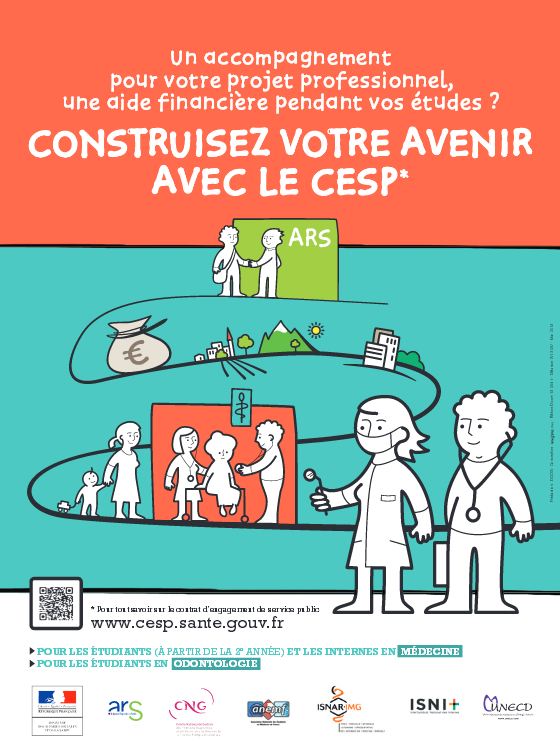Health Gateways
Public Service Commitment Contract - CESP
In return for a monthly allowance of €1,200, beneficiaries undertake - for a number of years equal to that during which they will have received the allowance and for a minimum of 2 years - to carry out their duties, from the end of their training, in specific practice locations in an area characterized by insufficient healthcare provision or difficulties in access to healthcare.

Public
These gateways provide direct access to :
- in 2nd year to holders of a Master's degree, IEP graduates and students in 3rd year (minimum) of a health curriculum requesting a reorientation,
- in 3rd year to graduates of PhD, Diplôme d'État or Ingénieurs whose title is recognized by the decree of January 13, 2014.
Bridging admissions are open only to students currently enrolled in a Master's or PhD program in France or the European Union, and to graduates of French or European institutions.
Diplomas issued by all other countries are not eligible for this procedure, even on presentation of a certificate of eligibility issued by the ENIC-NARIC Centre.
How to apply
Any candidate holding a diploma allowing access to the 3rd year cannot be authorized to compete in the 2nd year on the basis of this diploma.
It is forbidden to apply in the same year for more than one establishment belonging to the same examining center, or for more than one examining center in France and/or for more than one course of study.
The right to compete for a passerelle admission is limited: no-one can be admitted for more than two attempts, or even just one if two PACES/PCEM1/PCEP1 registrations have been made.
Candidates for the "passerelles" are admitted to one of the four branches of the health curriculum (medicine, pharmacy, dentistry, maieutics) via a regional competitive examination, without having to pass the PACES (Première Année Commune aux Études de Santé, ex PCEM1 and PCEP1).
This competitive examination consists of a file review and an interview for eligible candidates.
France is divided into examination centers, designated by the Ministry, each covering several university towns.
The Montpellier center covers the South-East region, and includes the Faculties of Medicine, Pharmacy, Odontology and Midwifery of Nice, Aix-Marseille and Montpellier-Nîmes.
Each examining center sets up a commission made up of 12 lecturers representing the regional universities concerned, distributed as follows: 3 doctors, 3 pharmacists, 3 dental surgeons and 3 midwives.
Selection process
Between the end of January and the end of March: applicants submit an application to the faculty where they wish to study. They are not allowed to apply to more than one institution in the same year.
The application file is made up of documents listed in a ministerial order.
Applications received by post or hand-delivered after this deadline will not be presented to the committee. It is therefore the responsibility of applicants to ensure that their applications are received by post within the statutory deadline.
- Early April: eligible applications are forwarded to the examining center, which again checks applications and ensures that there are no multiple applications at national level.
- In May/June: these applications are forwarded to the bridging commission, which examines them in an eligibility phase.
Following this first phase, the examining center sends an e-mail and a letter to the candidates selected to take part in the 10-minute admission oral(the exact procedure for the oral will be specified to eligible candidates in the invitation letter).